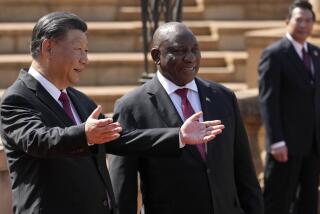Some More Equal Than Others, Yeltsin Proves
MINSK, Belarus — When 11 leaders of the new Commonwealth of Independent States met in Minsk this week, they emerged with 15 separate agreements, the most important establishing unified command over nuclear arms and freeing the former Soviet republics to form their own conventional armies.
Behind the scenes, however, signs of confusion and tension among the members of the amorphous new structure abounded.
Commonwealth leaders, including Russian Federation President Boris N. Yeltsin, repeatedly stressed that Russia, for all its vastness, is supposed to be a mere “equal among equals” in the loose new grouping.
But for all the denials of Russia’s superior weight, it found expression in that ultimate of all arbiters: the limo line.
Of all the leaders being ferried around Minsk in broad, black limousines, only Yeltsin had a super-deluxe Zil. The rest rode in more prosaic Chaikas.
And even more telling: As the line of cars waited near the palace where the talks took place at midday, only the Russian limousine was clean of splattered slush. It had been painstakingly polished by a team of drivers.
Rasim Agayev, press secretary to Azerbaijani President Ayaz Mutalibov, had the most colorful analysis of the commonwealth’s current awkward stage:
With no real precedent in world politics, he said, the commonwealth “is in the position of a young, 16-year-old mother who has just given birth to her first baby and has no mother or mother-in-law to tell her what to do.”
Proposals for creating more permanent representation in Minsk, nominal capital of the new grouping of nations, made little headway despite the clear need for more organization.
According to Agayev, Belarus proposed Monday that just two delegates from each commonwealth member be based permanently in Minsk, but other leaders objected that no two people could be knowledgeable on a wide enough range of topics to handle all commonwealth business.
Furthermore, Agayev asked, who would prepare all the papers and documents if delegations did not even have secretaries?
Fears about Minsk’s inexperience as a host of major international events, and about the commonwealth’s general disorganization in these early days, proved well-founded.
The talks ran about seven hours longer than originally announced.
At one point, Tajikistan Foreign Minister Lakim Kaioumov arrived for a scheduled side-meeting of all 11 foreign ministers to find that he was the only one who showed up. All his colleagues were at the main meeting with their presidents.
The disorganization extended to the post-meeting news conference, with Belarus President Stanislav Shushkevich arriving first and looking around in bewilderment for the rest of the commonwealth leaders.
“Where are my colleagues? Lost?” he asked.
Finally, Moldovan President Mircea I. Snegur appeared, leaned toward Shushkevich and mouthed, “Where is Boris Nikolayevich?”--referring to Yeltsin.
“He’s in the building somewhere, that’s for sure,” Shushkevich could be heard to reply.
Minsk also lived up to its reputation as a bastion of old-style Soviet conservatism, right up to the red banner still being flown by the honor guard that met delegations at the airport.
For Ravil Zaripov, special correspondent for the the Moscow daily Moskovsky Komsomoletz, the finest example of Belarus’ retro flavor came when he tried to get an official stamp on receipts for his business expenses from supervisors at the press center, located in a large complex known as the House of Political Enlightenment.
The round stamp read, “Communist Party of Belarus--Social-Political Center of the Minsk Regional Party Committee.”
The changing times were reflected in the new splendor of the commonwealth leaders’ neckwear.
Shaking off the decades-old tradition of dreary, conservative grays and browns, their ties showed a new individuality.
Kazakhstan President Nursultan Nazarbayev sported the showiest--a clearly Western model in attractive purples. Not to be outshone, Kyrgyzstan President Askar Akayev wore a red-and-blue striped number that somehow went nicely with his gold teeth.
Even Yeltsin, whose formerly apparatchik-style wardrobe has shown definite signs of updating recently with the addition of double-breasted suits, wore a tie with bright tracings of red.
More to Read
Sign up for Essential California
The most important California stories and recommendations in your inbox every morning.
You may occasionally receive promotional content from the Los Angeles Times.










